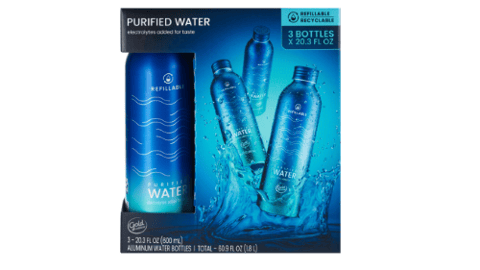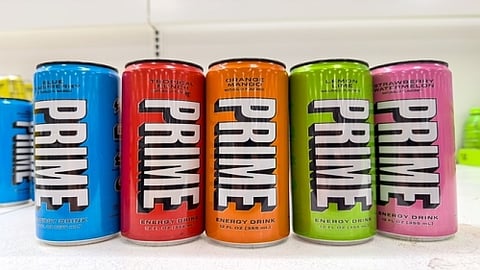Americans' Devotion to Packaged Water Rises
Americans remain devoted to bottled water. Last year, packaged water sales increased an estimated 12.8%, according to Mintel research.
“Water’s ultimate health halo, along with increased interest in small personal indulgences, signals new opportunities for premium, functional, sustainable packaged water products,” notes Caleb Bryant, associate director of food and drink reports at Chicago-based Mintel.
Bryant adds that category growth is concentrated on both ends of the price spectrum, with sales of private label bottled water showing a nearly 30% increase last year. At the same time, premium bottled water brands also experienced increased sales as consumers gravitated to lifestyle water brands.
New Flavors A Key Driver
Some brands in the sparkling water category were challenged by supply chain issues last year, but the category is expected to expand as new flavors and brands enter the category and consumers increasingly seek out flavorful, low-calorie alternatives to alcoholic beverages.
One of the fastest-growing independent sparkling water brands, Waterloo, wasn’t immune to supply chain issues, but according to Kathy Maurella, chief marketing officer at Austin, Texas-based Waterloo Sparkling Water, the brand has continued to grow through distribution, launching nationally in Albertsons/Safeway, Sprouts and BJ’s, as well as expanding shelf presence in core retailers such as Publix and Kroger.
[Read more: "What Is Taste Intelligence?"]
The brand recently added two new flavors to its lineup, Orange Vanilla and Ginger Citrus Twist, along with a limited-time-only Tropical Fruit sparkling water offering for summer, and is planning more new flavors for fall.
“Flavor innovation drives incremental growth for our brand and the category,” says Maurella. “Limited-time offers also play an important role, delivering a seasonal connection for additional consumer interest.”
Other brands are vying for shelf space with new flavors. The Coca-Cola Co.’s Topo Chico recently launched Topo Chico Sabores, a new sub-brand collection of sparkling water flavored with fruit juice and herbal extracts. The line consists of three flavors: Blueberry, with a hint of hibiscus extract; Tangerine, with a hint of ginger extract; and Lime, with a hint of mint extract.
“The mass popularity of the Topo Chico Twist of Grapefruit and Twist of Lime flavors pointed toward an opportunity to double down on flavor,” observes Fred Mitchell, marketing director for the Atlanta-based brand. “We selected the new flavors based on consumer interest and demand. There is a rise in consumer interest for more citrus-forward flavors and fusions.”
The Topo Chico Sabores line is packaged in aluminum cans, a departure from Topo Chico’s signature glass bottle. Mitchell notes that the packaging is suited to summertime occasions in locations where glass may not be allowed, such as parks, concerts, beaches and skate parks.
The Clearly Food & Beverage Co., based in Gormley, Ontario, recently launched Clearly Canadian Essence in two flavors, Grapefruit and Limon. The new line contains only sparkling Canadian spring water and natural vegan flavors, with no added sweeteners and only natural ingredients.
Watermelon has emerged as a favorite flavor among still water brands this year, with both the Boxed Water and Lemon Perfect brands adding limited-edition watermelon flavors to their lineups.
“We decided to add watermelon as a summer splash, since we felt there was critical mass for water hydration with subtle, natural flavors that pair with different seasons or varying times or occasions in the day,” explains Kavita Shah, VP of marketing at Holland, Mich.-based Boxed Water.
Functional Attributes Gain Favor
Premium water brands, such as those with functional attributes, have been on the rise, and Mintel sees more opportunity for growth in that segment.
“Brands such as Waiakea Water and ZenWTR have successfully hit the intersection of luxury and sustainability by combining unique, environmentally friendly claims with alkalinity and purity claims,” notes Mintel’s report.
Alkaline water brands, traditionally targeted to athletes and fitness enthusiasts, are gaining a wider audience. Alkaline water, which has a higher pH (from 8.0 to 10.0) than normal tap water (around 7.0) and is believed to benefit digestion and the immune system, is growing increasingly popular with consumers.
Wintersville, Ohio-based Beverage Marketing Corp. estimates that by the end of 2024, alkaline water will comprise about 20% of the value-added water market. While Mintel’s research shows that Millennials are the most frequent users of functional beverages, Gen Zs and Gen Xers are demonstrating strong interest and current use of these beverages.
Sensing increased opportunity, Atlanta-based Coca-Cola recently reintroduced its smartwater alkaline offering to boost the brand’s presence in this fast-growing category. The product contains a higher pH level than smartwater’s original offering and now includes selenium and a unique electrolyte blend.
The beverage giant is putting plenty of marketing muscle behind the product with an Elevate How You Hydrate marketing campaign that includes new brand ambassadors: actor and comedian Pete Davidson, Peloton instructor Alex Toussaint, track star Bianca Williams, and BMX biker Nigel Sylvester.
"With enormous growth potential in the $1 billion alkaline space, we’re putting the full weight of our brand behind this differentiated offering,” said Ulises Ramírez, group director, hydration portfolio, Coca‑Cola Co. North America, at the time of the launch. Ramírez added that the new product “hits the sweet spot between sports drinks and lifestyle waters,” and is expected to bring new drinkers into the smartwater fold and accelerate the brand’s overall growth.
The brand enters an already crowded category. Perfect Hydration Alkaline Water is another brand strategically partnering with athletes across an array of disciplines. The brand offers several packaging sizes but has been particularly successful with its gallon jug size.
“We’re the industry’s only gallon of premium alkaline water in a 100% recycled and recyclable vessel,” points out Louisa Lawless, chief strategy officer for Vernon, Calif.-based Perfect Hydration Alkaline Water. “Some of our consumers drink straight from the gallon; others use it to fill their own reusable bottles.”
The Alkaline Water Co.’s Alkaline 88 brand has been making a splash in the segment, having distribution of its brand increase to 11,000 new stores across the country last year. In the past 12 months, the Scottsdale, Ariz.-based company also added new SKUs in more than 33,000 existing locations.
Heart Water, an alkaline product made with purified rainwater, is also expanding its distribution beyond an initial launch in the Southwest with a Northeast rollout this year. The Buda, Texas-based brand is positioned as an eco-friendly option from both a production and packaging standpoint. Heart Water avoids a water-wasting reverse-osmosis process and packages its water in bottles made of recyclable aluminum.
Greater Focus on Sustainability
Heart Water’s sustainability claims are a valuable differentiator in a category increasingly focused on sustainability. “Companies must focus on the development of sustainable water products in order to retain eco-conscious younger consumers,” notes Mintel’s most recent report.
According to Dana Barba, SVP of marketing at Atlanta-based Lemon Perfect, 68% of the brand’s consumers express concerns about the environment and view being environmentally friendly as important. Barba adds that the brand, which boasts immune-boosting vitamin C and antioxidant benefits, is certified plastic neutral.
Mintel’s research reveals that no single claim defines sustainable bottled water. “The entire product must communicate sustainability, from the packaging materials used, to charitable donations, to the responsible sourcing of the water itself,” the market research firm’s report observes.
Manufacturers are concentrating more efforts on making their packaging and production sustainable and communicating that information to consumers.
Last year, Coca‑Cola rolled out Dasani bottles made from 100% recycled PET plastic (excluding caps and labels). Coca-Cola is working with communities to boost PET recycling and collection, collaborating with recycling partners, and securing recycled PET to help ensure the material for its bottles is used again and again. To drive awareness, Dasani bottles feature on-pack “100% Recycled Bottle*” and “Recycle Me Again” calls to action, and the messaging is used on retail signage and other communications.
Boxed Water, for one, is continuing to push the envelope of renewability. “Following our independent ISO-certified lifecycle analysis, we moved to plant-based caps made from tree pulp waste,” notes Shah. “We are working with the Carton Council to increase curbside recycling across the U.S.”
The company also recently teamed up with Shelburne, Vt.-based nonprofit One Tree Planted to help urban communities achieve tree equity. “With the National Forest Foundation, we’ve planted 1.4 million trees in our national forests, and we’re expanding that effort to do more in specific cities in the U.S.,” says Shah. “We’re always looking to do better.”








